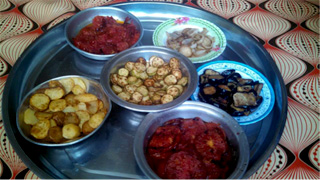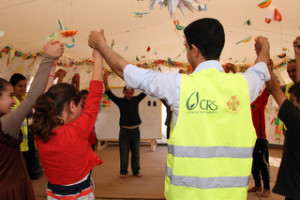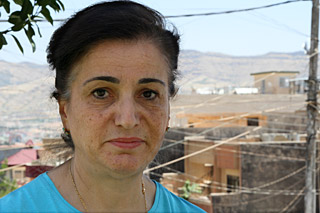
Media CenterIraq Journal: Assisting Families Who Fled ISIS
Catholic Relief Services' (CRS) Nikki Gamer is in Dohuk, Iraq this week, writing daily reflections about CRS assistance to thousands of displaced families who fled the Islamic State (IS).
DAY 4
On June 12, it will be a year to the day that Catholic Relief Services (CRS) Iraqi staffer Hasmek Kiekorian escaped Mosul with her family.
“We say it’s our anniversary,” Hasmek says. “You know those situations where you are so sad you can’t cry? That’s how it is.”
Hasmek describes the escape as a chaotic rush to leave the home she shared with her sister and her mother as fighters from the Islamic State closed in. Dawn was approaching when Hasmek heard a traditional Islamic phrase shouted in a way that let her know trouble had come.
“We had a big home with three floors. I went up to the roof and I heard screaming, ‘Allahu Akbar, Allahu Akbar,’” – God is Great -- Hasmek recalls. “And I could see black cars with black flags. So I came downstairs to my sister and I said, ‘Pack everything.’”
The family shoved what they could into their small car and fled to Dohuk in Iraqi Kurdistan. During the drive, they wrapped their heads in scarves, afraid to reveal their Christian identities. For Hasmek, the trauma of the escape and the continued uncertainty over her future has made life in Dohuk difficult.
“The hardest thing is that you feel lost. You don’t know what will happen,” Hasmek says. Among those items she left behind: A collection of Armenian books passed down through generations, countless heirlooms, treasured family photos, and nearly all her clothes.
“When we got here, we had to start from zero,” she adds. Many CRS and Caritas staff are caught in the in between. Even as their reality is similar to that of the very people they’re helping -- the loss of a home, of friends and family, of identity – they still feel lucky to be alive, and living in a relatively safe area with jobs that allow them to return to something like normalcy.
“You know why I want to work? Yes, it’s for my income. But it’s also to escape from thinking,” explains *Omar, a 41-year-old CRS project manager.
I have been able to spend a lot of time with Omar here in Kurdistan. He helped translate some of the interviews I did in the field. At times I could see the pain on his face as he listened to people’s stories. I could tell that they were all too similar to his own.
“This is difficult,” he told me as we interviewed a displaced Yazidi woman. “I’m Yazidi too.”
Omar is a civil engineer with a wife and two children. Before fleeing his small village near Mosul, he worked as a supervisor at an engineering company. He loved soccer and played frequently with friends. But since his displacement, he’s stopped playing the game altogether.
“In my village I played with my friends. We even had a small team. Now all of them are displaced,” Omar explains. “I think of my life now as ‘the before’ and ‘the after.’”
I took solace in seeing how much pride Omar takes in his work. He is part of the CRS and Caritas Iraq team that’s installing windows and doors in hundreds of unfinished buildings in the region so that the displaced families living in them have a more dignified, safe place to live.
I asked Omar about his job, and his answer echoed the sentiments I’ve heard from so many CRS Iraq staffers I’ve met throughout the week.
“When I see the smiles of these displaced people…When they say ‘thank you’ for our work, I’m grateful,” Omar says.
I’ll be thinking about Omar long after I leave here. I’ll be thinking about Hasmek, too. And I’ll be thinking about all of the beautiful people I’ve met along the way.
I’ll also be leaving with some guilt. I can get away from the violence that has trapped so many innocent Iraqis. But for Omar, and the millions like him, there is no escaping it. For now.
“I have a car,” Omar says. “And if my fuel gauge reaches half-full, I re-fill it immediately because maybe in the night, something will happen to us. Maybe we’ll have to flee again.”
*Name has been changed for privacy
-----------------------------------------------------------------
DAY 3
On the third day of my reporting trip to Iraqi Kurdistan I traveled about 65 miles south of Dohuk, to the Akre district, where Catholic Relief Services and Caritas Iraq were conducting one of their first food voucher distributions.
There to write about it, I was talking to people receiving the vouchers. That’s how I met 56-year-old Salahaldin Yaseen whose story hit me hard, making me understand the full extent of the humanitarian crisis here in a way I hadn’t before.
Salahaldin owned a small vegetable shop in Mosul, the largest city in northern Iraq, until the Islamic State (IS) invaded about a year ago. We talked about many things, mostly about his beloved family; his wife of 40 years, their eight children. When speaking about his wife, he became so effusive that at one point I blushed.
But because of IS, his family has been broken up. Four of his children, and multiple grandchildren, are trapped in Mosul. And while they are lucky to be alive, they’re living in the most horrific circumstances; his two daughters are confined to their houses, food is running out, and connectivity to the outside world is minimal. When Salahaldin tried calling his grandson recently on his fourth birthday, he barely got a “Hello” in before the line went dead.
But what really weighs on me is how this lovely, dignified man, who could have been my dad, my uncle, or so many kind men I’ve known over the years, is stuck in a place that’s not his home without so many of the family members he holds so dear.
After we waited in line for his CRS voucher to come through, on what was a brutally hot day, we left the distribution site for a grocery store, where I watched him buy three bags of groceries meant to last his family for one month. To see this man at the grocery store in such circumstances made me feel his plight and that of all of the innocent Iraqis forced to cope with such an awful situation. I was glad that we were able to give him help, but I was sad that he needed it.
Salahaldin must have been reading my thoughts; at one point during the day, he looked at me -- exasperation in his eyes, sweat pouring down his face -- and said, “When will we see the end of this?”
-----------------------------------------------------------------
DAY 2
Stewed tomatoes. Freshly picked parsley. Fried potatoes, zucchini, and eggplant. Sautéed onions. Homemade biscuits with dates. And of course, tea. On day two of my Catholic Relief Services (CRS) reporting trip to Iraqi Kurdistan, this grand meal was prepared for me and some of my CRS and Caritas Iraq colleagues by a Yazidi family displaced from Sinjar District less than a year ago by the Islamic State.
The meal took me by surprise.

I wasn’t expecting people who had so little to give so much. Despite our polite attempts to decline the bounty, the family encouraged us to eat and enjoy our time with them. This was after they graciously recounted their stories so that we could document some of the important work CRS is doing to help displaced families in immediate need of humanitarian assistance.
This family fled to the Dohuk region in northernmost Iraqi Kurdistan. There CRS and Caritas engineers and their teams have been installing windows and doors in unfinished buildings that are now home to many of those from Sinjar, about 100 miles south of Dohuk, who have escaped the violence. Though previously barely inhabitable – with unfinished door and window openings letting in the relentless Iraq summer heat and even scorpions – these buildings now provide at least a certain level of comfort.
I had been told that Iraqi hospitality was to be expected. But the kind invitations, generous meals and great conversation over customary sweetened tea is something more than hospitality. It’s a generosity of spirit.
Something else surprising was the emotional response of the family to our visit. You might expect their recent trauma to make them wary of strangers, but instead they seemed excited to let us into their home. And I was happy to eat good food among good company. As I hugged each family member goodbye, I tried my best to express those sentiments. But I didn’t have the last word. As we were leaving, the matriarch of the family, a 45-year-old woman named Namleat Abdullah Ali, motioned me back, and pulled her face to my ear.
“This has been the best day we’ve had since we fled Sinjar,” she said. “Thank you.”
-----------------------------------------------------------------
DAY 1
When, sitting in Baltimore, I read a newspaper article or click through an online story of an atrocity committed in some far-flung place across the globe, it can be easy for me to move on with my day, to leave the story on the page. But forming personal connections makes the reality of such horrors hit home.

Today was my first day in Iraq reporting on what Catholic Relief Services (CRS), in partnership with Caritas Iraq, is doing in Iraqi Kurdistan to help the thousands of families fleeing the Islamic State (IS). I spent the morning observing our Child Support Centers, tented areas where CRS and Caritas volunteers lead children through games and activities meant to help them cope with the trauma so many have experienced. They receive basic education, too. The activities at the centers were a joy to watch. I couldn’t help but get caught up in the thrill of cheering the kids through their games, including a particularly entertaining relay race.
Later in the day, I interviewed displaced Yazidi families living in nearby temporary shelters, unfinished homes that CRS refurbished with windows and doors.
I met a soft-spoken 20-year-old woman who recounted how while she narrowly escaped capture from IS, her parents, brothers, and sisters were taken and haven’t been seen since. I also met a family who fled IS only to spend eight days trapped on Sinjar Mountain without food and water. The mother, with tears in her eyes, described watching her children slip in and out of consciousness due to hunger and dehydration. She said each day is still like a new nightmare for them, that they continue to live in fear that IS will take them away.
These stories were difficult to hear.
My hope is that through writing about them and talking to people back home about what I’ve seen, I can personalize their plight, so it will be harder to leave the story on the page. I’ve also taken solace in knowing that the work of CRS is returning some joy to their lives.
I keep with me the remark of a Yazidi mother about watching her children at play in one of the Child Support Centers; “Whenever I see a smile on one of their faces, I know that deep down, everything is going to be OK.”
Nikki Gamer is CRS' Communications Officer for Europe, the Middle East and Central Asia. She is based in Baltimore, MD.


